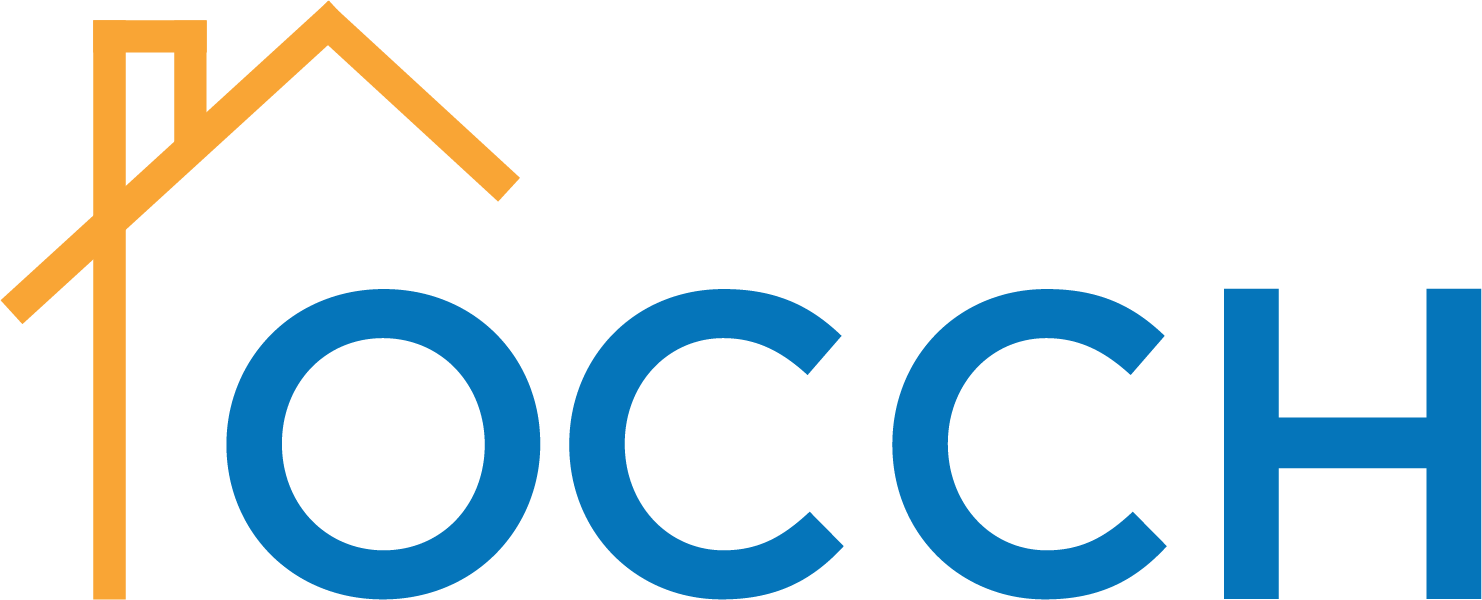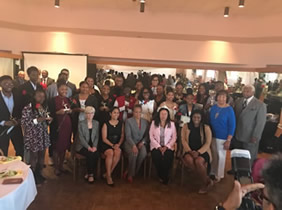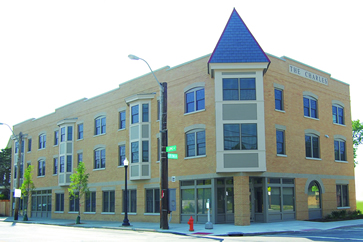
News
Unlocking Opportunities in Education
September 3, 2018
(In 2012, OCCH created a non-profit affiliate – OCIC to manage its philanthropic activities. Since inception, OCIC has been capitalized with more than $23 million, integrating mission-related grants and equity investments through OCCH to increase opportunities for residents of affordable housing, and support partners working to help low-income households and communities thrive toward better lives.)
Jerry Grier Scholarship ProgramUnderlying our commitment is an unwavering belief in the power of education to help children, youth and adults develop their full potential. To unlock opportunities for college-bound students, improve the quality of students’ lives on their pathway to and through college, and boost their odds of success in school, OCIC supports a multi-faceted funding strategy that brings resources to thoughtful interventions at all stages - elementary through college and beyond. At the heart of our efforts is the Jerry Grier Scholarship program, a $1 million fund created in 2015 that provides up to $10,000 in tuition and performance-based assistance to residents of housing tax credit developments in which OCCH has investment. Named for Jerry Grier who served on the Board of Directors for the OCCH for many years and who was longtime Area Counsel for the U.S. Department of Housing and Urban Development, more than 60 low-income, first-generation and non-traditional students have received important financial support as they work toward completion of an associates, bachelors, or advanced degree. Grier, best known for his accomplishments while legal counsel at HUD, his commitment to growing the next generation of leadership, as well as his candor and wit, believed that while great talent and potential are equally distributed across the broad population of the communities in which OCCH has investments, perhaps access to educational opportunity is not. The strength of this belief compelled him to promote the idea that affordable housing should provide more than a basic shelter and housing stability, instead - helping children, youth and young adults learn, succeed, and grow beyond their disadvantage. “Jerry believed in education,” revealed Mike Saad, Attorney, member of the Board of Directors also for the OCCH, and longtime friend to Grier who passed away in 2014. An African-American and product of the small northeast Ohio city of Alliance, it is not difficult to imagine the pervasiveness of segregation and inequality that Grier, born in 1935, would need to overcome to year’s later find himself on the main campus of the Ohio State University where he attended the Michael E. Mortiz Collage of Law beginning in 1964. “And that’s where we met,” said Saad who remembers Grier as a smart and attentive student. “Because of his academic efforts, he was able to rise far above where he started, said Saad. “Education was a principled way – the key – to his getting ahead in life.” Lived experience is what uniquely qualified Grier to advocate for initiatives that would make better the lives of people living in affordable housing. “As an attorney, Jerry was close to many of the multifamily and community development transactions in our early years that today we are seeking to preserve as affordable housing,” said Hal Keller, President of OCCH. “So often, we talk about the positive, place-based effects of affordable housing development and revitalization, but Jerry was the first to raise the issue of concentrated poverty at a time when no one else really would.” |
Columbus Scholar HouseIn more recent years, improving education outcomes, particularly for low-income children from families living in areas of concentrated poverty, has emerged as a leading topic of concern for researchers, policymakers, and educators. This awareness stems from recognition that neighborhood conditions influence children’s life outcomes as much as school choice. Affordable housing practitioners are developing strategies, including both housing mobility demonstrations and place-based interventions that focus activities to improve educational access and neighborhood quality to promote the well-being of families and children. Columbus Scholar House, a unique housing tax credit development combining housing and education to expand opportunities for upward mobility, is a prominent example of a community directed, place-based intervention. The model finds its origins in Kentucky, and was successfully piloted in Columbus, Ohio through a partnership with Community Properties of Ohio (CPO), Columbus Metropolitan Housing Authority, OCCH, and the Affordable Housing Trust of Columbus and Franklin County. The original phase, which launched as a pilot in 2012, received Neighborhood Stabilization Program (NSP) funding to renovate a historic building into a mixed-use space that now holds the Future Scholars Community Learning Center and ten residential units for first-generation college students and parenting adults. Scholar House residents must be 18 years of age, low-income, the custodial parent of at least one child, and be enrolled in a degree-seeking program at an accredited college or university. Through collaboration with the Columbus Metropolitan Housing Authority, all residents are qualified for a Section 8 Project Based Voucher to offset their housing costs, as well as affordable on-site childcare through a partnership with the YMCA of Central Ohio along with supportive services and supports that help parenting-students overcome barriers to completing their degree. Private on-site amenities include a fitness room, computer room, and playground with walking path. |
Rotisha’s StoryBefore deciding to go back to school to pursue a degree in nursing, Rotisha James was like many workers in Central Ohio, toiling for 40 hours per week or more in a growing labor market with far too many low-wage jobs. “I was working extremely hard and didn’t have hardly any income,” she shared, recounting the overwhelming stress of the financial responsibilities she bore as a single mother of a growing family. “My car note was due, I had issues with my landlord, and my rent was late all the time - [it] was stressful.” After giving birth to the youngest of her children, twin boys, James made a radical decision to leave her full-time job where she’d worked for years and return to school full-time. “I felt in my heart it was right and I was ready to move forward in life.” In the months leading up to this choice, she would awake in the middle of the night and pray for opportunities to create the life to which she aspired, both for herself and her children. Three months later, a solution would present itself to James in the form of Columbus Scholar House. James had never had any form of housing assistance and her credit profile showed some unresolved issues. But when she called to inquire about an available unit and the application process, the property manager provided the encouragement and support she needed to move forward. In a matter of days, James was approved and moved into the development as one of the original residents of the Charles Building in 2013. Since that time, James has earned an Associate’s Degree and continues to work toward a Registered Nurse certification. In 2018, she was awarded the Jerry Grier Scholarship to recognize and support her efforts. Funded through OCCH and administered by I Know I Can, a Columbus-based college access program, James and other recipients are eligible for both tuition and performance-based assistance to offset the cost of college tuition and student-related expenses such as books, or equipment required for courses. “[Columbus Scholar House] has been huge to me,” said James, “it has opened up additional resources that have helped me and I couldn’t be where I am without that support.” |
Greater Columbus Helping HandsIn addition to the Jerry Grier Scholarship program, OCCH strengthens pathways to and through college by supporting other community-based organizations that assist students from less than advantaged backgrounds as they pursue higher learning. One of those such organizations is Greater Columbus Community Helping Hands, which has served more than 400 graduating high school seniors from Columbus City Schools, Whitehall City Schools and college-bound students specifically residing in affordable housing communities throughout Central Ohio. Greater Columbus Community Helping Hands operates programming grounded in best practices for increasing college retention and graduation rates among students with barriers. Through workshops and training, students gain self-confidence and critical life skills in areas such as time management, self-presentation, financial literacy, and leadership. In addition, students are equipped with a laptop, printer, and dorm room package with all the materials they need to make a successful transition into campus life. “I have noticed that I am more prepared, and more successful because of my laptop and printer… I have been able to achieve the Dean’s list this semester, and it is all because of Greater Columbus Community Helping Hands,” one recipient described. Other special students include a young woman entering Morehouse College to pursue a medical degree after graduating from Spelman University, and a young man attending Ohio University with the goal to become an airplane pilot after completing an ROTC program. Scholarships and supports provided by OCCH and Greater Columbus Community Helping Hands have also worked together to jointly benefit a number of students, including James and other residents of Columbus Scholar House, as well as Homeport and Wallick communities. In 2018, Fifth-Third Bank Community Development Corporation provided a generous grant of $70,000 to support the work of Greater Columbus Helping Hands, assisting 43 students from affordable housing developments as they ‘stepped off to college.’ You can hear more from Rotisha’s story, check out the 2017 Annual Report video where her story is featured in a showcase of our best work. To learn more about the Jerry Grier Scholarship Fund, contact Annie Ross at aross@occh.org. To connect with Greater Columbus Community Helping Hands and learn how you can support hard-working students, visit their website. |



